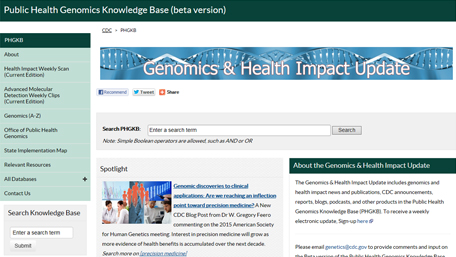Category: genetics
Newborn screening for severe combined immune deficiency (SCID) saves lives and money: a cost-effective public health policy

Severe combined immune deficiency (SCID), also known as “bubble boy disease,” is a rare inherited disorder of the immune system that leads to recurrent severe infections. In the absence of effective treatment, SCID is usually fatal within the first 2 years of life. Treatment by hematopoietic cell transplantation can minimize the devastating effects of SCID, Read More >
Posted on byDirect-to-Consumer Genetic Testing and Public Health Education

We have previously blogged about the value (or lack thereof) of direct-to-consumer (DTC) genetic tests in improving health. In a 2011 blog entitled “think before you spit” we cautioned that there was very little evidence that the use of such tests improves health and prevents disease for healthy people in the population. The blog was Read More >
Posted on byNational Family History Day 2015: Thinking globally and acting locally

Though you probably will not find greeting cards in stores celebrating this fact, Thanksgiving has been known as National Family History Day in the U.S. since 2004. The Office of the U.S. Surgeon General and many federal, state and private partners have marked each year with events and announcements promoting the collection and use of family Read More >
Posted on byDealing with the Genomics and Health Information Overload: Introducing the CDC Public Health Genomics Knowledge Base

Understanding genetic information is increasingly becoming important for health decision making for a variety of health conditions across the lifespan. The amount of genome-related information is growing exponentially, but it is scattered all over the web, peer-reviewed literature, and public and private databases. The CDC Office of Public Health Genomics has launched the beta version Read More >
Posted on byCelebrating a Decade of Evidence-Based Evaluation of Genomic Tests

CDC’s Office of Public Health Genomics (OPHG) launched the Evaluation of Genomic Applications in Practice and Prevention Initiative (EGAPP) in 2004. The independent EGAPP Working Group (EWG) celebrated a decade of achievements and accomplishments at their meeting in Atlanta on October 27-28, 2014. The EWG is comprised entirely of volunteers, encompassing multiples areas of expertise Read More >
Posted on byEpigenetics and Public Health: Why We Should Pay Attention

In September 2014, one of us (MJK) spoke on the topic of epigenetics at the Annual Meeting of the Association for State and Territorial Health Officials (ASTHO). ASTHO is a national organization representing public health agencies in the United States. ASTHO members formulate and influence public health policy and practice. In the midst of a Read More >
Posted on byNobody is average but what to do about it? The challenge of individualized disease prevention based on genomics

Each week, Garrison Keillor shares with National Public Radio listeners the latest news from Lake Wobegon where “all the women are strong, all the men are good looking, and all the children are above average.” The concept of “average” is deeply rooted in our scientific analysis of all health related traits such as height, Read More >
Posted on byGeography, Genetics and Leading Causes of Death

In the United States, the 5 leading causes of death are heart disease, cancer, chronic lower respiratory diseases, cerebrovascular diseases (stroke), and unintentional injuries. On May 2, 2014, the Centers for Disease Control and Prevention released an MMWR report on the annual number of potentially preventable deaths from these 5 causes in the United States. Read More >
Posted on byEvidence Matters in Genomic Medicine- Round 4: Where are we with Pharmacogenomic Tests?

Previously, CDC’s Office of Public Health Genomics announced a list of health-related genomic tests and applications, stratified into three tiers according to the availability of scientific evidence and evidence-based recommendations and systematic reviews. The list is intended to promote information exchange and dialogue among researchers, providers, policy makers, and the public. Initially the table relied Read More >
Posted on byReconciling the future of genomic medicine with its current reality: how do we get there from here?

On March 5-6, 2014, I attended the 7th annual Future of Genomic Medicine (FoGM) conference [PDF 778.13 KB], hosted by Dr. Eric Topol at the Scripps Translational Science Institute. The audience included more than 500 participants from various fields including genomics, clinical medicine, laboratory medicine, industry, economics, social and communication sciences, patients and the press. Read More >
Posted on by

